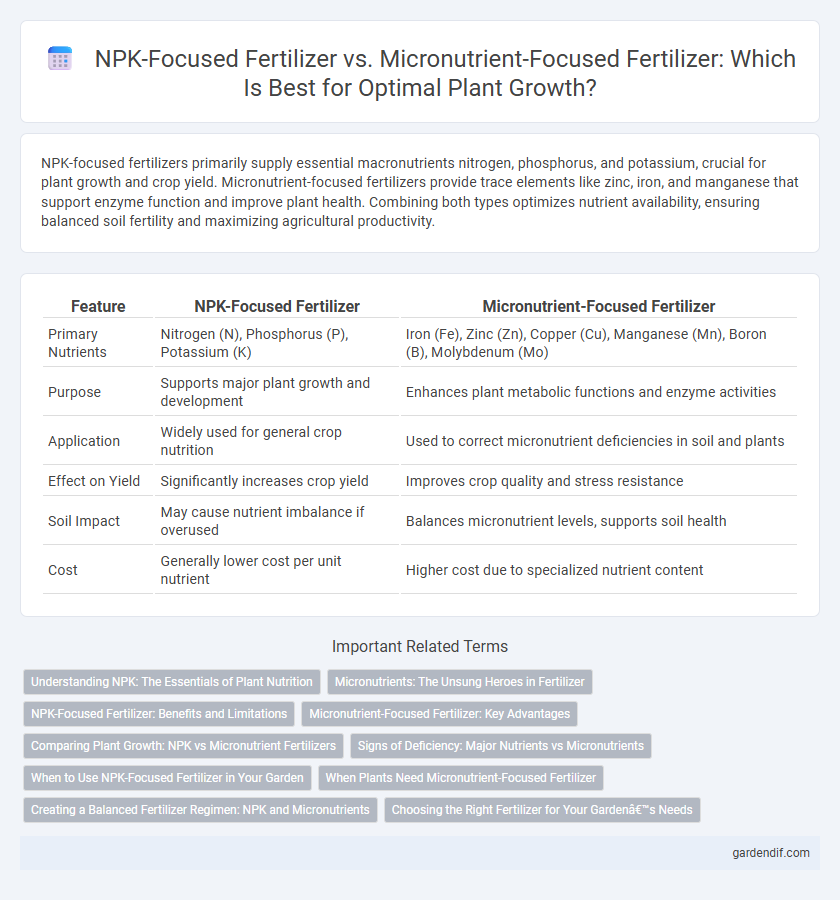
NPK-focused fertilizer vs Micronutrient-focused fertilizer Illustration
NPK-focused fertilizers primarily supply essential macronutrients nitrogen, phosphorus, and potassium, crucial for plant growth and crop yield. Micronutrient-focused fertilizers provide trace elements like zinc, iron, and manganese that support enzyme function and improve plant health. Combining both types optimizes nutrient availability, ensuring balanced soil fertility and maximizing agricultural productivity.
Table of Comparison
| Feature | NPK-Focused Fertilizer | Micronutrient-Focused Fertilizer |
|---|---|---|
| Primary Nutrients | Nitrogen (N), Phosphorus (P), Potassium (K) | Iron (Fe), Zinc (Zn), Copper (Cu), Manganese (Mn), Boron (B), Molybdenum (Mo) |
| Purpose | Supports major plant growth and development | Enhances plant metabolic functions and enzyme activities |
| Application | Widely used for general crop nutrition | Used to correct micronutrient deficiencies in soil and plants |
| Effect on Yield | Significantly increases crop yield | Improves crop quality and stress resistance |
| Soil Impact | May cause nutrient imbalance if overused | Balances micronutrient levels, supports soil health |
| Cost | Generally lower cost per unit nutrient | Higher cost due to specialized nutrient content |
Understanding NPK: The Essentials of Plant Nutrition
NPK-focused fertilizers deliver essential macronutrients--nitrogen (N), phosphorus (P), and potassium (K)--which are crucial for plant growth, root development, and overall yield improvement. Micronutrient-focused fertilizers supply critical trace elements like iron, manganese, zinc, and copper that support enzymatic functions and disease resistance but are required in smaller quantities. Understanding the balance and role of NPK in soil nutrition is fundamental for optimizing crop productivity and enhancing nutrient use efficiency.
Micronutrients: The Unsung Heroes in Fertilizer
Micronutrient-focused fertilizers deliver essential trace elements like zinc, iron, manganese, and copper, which are critical for enzymatic functions and overall plant health but are often deficient in NPK-heavy fertilizers. Unlike NPK fertilizers that primarily supply nitrogen, phosphorus, and potassium for growth and yield, micronutrient fertilizers correct soil imbalances and prevent specific nutrient deficiencies that can stunt crop development. Incorporating micronutrient fertilizers ensures improved nutrient uptake efficiency, enhanced stress tolerance, and higher crop quality, making them indispensable for sustainable and balanced fertilization strategies.
NPK-Focused Fertilizer: Benefits and Limitations
NPK-focused fertilizers provide essential macronutrients nitrogen, phosphorus, and potassium, which are crucial for plant growth, root development, and fruit production, enhancing crop yield and quality. These fertilizers offer balanced nutrient supply tailored to specific plant needs, promoting efficient nutrient uptake and improved soil fertility. However, reliance on NPK fertilizers alone can lead to micronutrient deficiencies, soil degradation, and environmental concerns such as nutrient runoff and groundwater contamination.
Micronutrient-Focused Fertilizer: Key Advantages
Micronutrient-focused fertilizers deliver essential trace elements like zinc, iron, manganese, and copper that are vital for plant metabolic processes and enzyme functions, leading to improved crop quality and yield. These fertilizers enhance nutrient uptake efficiency and help correct specific micronutrient deficiencies often overlooked by traditional NPK fertilizers, which primarily supply nitrogen, phosphorus, and potassium. The targeted nutrient supply supports sustainable soil health and promotes resilient plant growth under diverse environmental stress conditions.
Comparing Plant Growth: NPK vs Micronutrient Fertilizers
NPK-focused fertilizers provide essential macronutrients--nitrogen, phosphorus, and potassium--that drive vigorous plant growth, leaf development, and root establishment. Micronutrient-focused fertilizers supply trace elements like iron, zinc, and manganese, which are critical for enzymatic functions and chlorophyll synthesis, directly affecting crop quality and stress resistance. Comparing plant growth, NPK fertilizers boost biomass and yield volume, while micronutrient fertilizers enhance nutrient uptake efficiency and overall plant health.
Signs of Deficiency: Major Nutrients vs Micronutrients
NPK-focused fertilizers address deficiencies in nitrogen, phosphorus, and potassium, which manifest as yellowing leaves, stunted growth, and poor fruit development. Micronutrient-focused fertilizers target elements like iron, zinc, and manganese, with deficiency signs including chlorosis, leaf curling, and interveinal discoloration. Identifying specific symptoms ensures accurate nutrient application, optimizing plant health and yield.
When to Use NPK-Focused Fertilizer in Your Garden
NPK-focused fertilizer is essential during the initial stages of plant growth when nitrogen, phosphorus, and potassium needs are highest to support root development, leaf growth, and overall plant vigor. Use NPK fertilizers in early spring or at the time of planting to provide balanced macronutrients that promote healthy seedling establishment and robust flowering. This type of fertilizer is most effective in nutrient-deficient soils where primary nutrients are lacking, ensuring optimal nutrient availability for crops and garden plants.
When Plants Need Micronutrient-Focused Fertilizer
Plants require micronutrient-focused fertilizer when specific deficiencies in elements like iron, zinc, manganese, copper, or boron limit their growth and development despite adequate NPK levels. Micronutrients play crucial roles in enzymatic functions, chlorophyll production, and disease resistance, which cannot be substituted by macronutrients alone. Soil tests and plant tissue analysis help identify these deficiencies, guiding the targeted application of micronutrient fertilizers to optimize crop yield and quality.
Creating a Balanced Fertilizer Regimen: NPK and Micronutrients
A balanced fertilizer regimen integrates NPK (nitrogen, phosphorus, potassium) with essential micronutrients such as zinc, iron, and manganese to optimize plant growth and yield. While NPK fertilizers supply the primary macronutrients critical for biomass production and root development, micronutrient-focused fertilizers address specific nutrient deficiencies that impact enzymatic functions and overall plant health. Combining these nutrient sources ensures comprehensive soil nutrition, enhances nutrient uptake efficiency, and promotes sustainable crop productivity.
Choosing the Right Fertilizer for Your Garden’s Needs
NPK-focused fertilizers provide essential macronutrients nitrogen, phosphorus, and potassium, crucial for overall plant growth, root development, and flowering, making them ideal for general garden use. Micronutrient-focused fertilizers supply trace elements like iron, zinc, and manganese, which are vital for specific physiological functions and correcting nutrient deficiencies in soil. Selecting the appropriate fertilizer depends on soil testing results and the specific nutritional requirements of your plants to optimize growth and yield.
NPK-focused fertilizer vs Micronutrient-focused fertilizer Infographic

 gardendif.com
gardendif.com